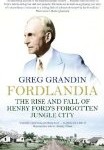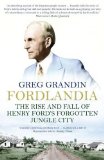In 1927, Henry Ford, founder of the Ford Motor Company, bought a 5,000-square-mile area of the Amazon rain forest. He wanted to combat rising rubber costs by creating his own supply and to bring his idealised version of America to a remote area of Brazil. Ford created a small town in the middle of the rain forest. Neat rows of houses were built, along with everything an American family would need to entertain them. Unfortunately golf courses and cinemas were not enough to distract from the dangerous wildlife and diseases that plagued Fordlandia. The battle between Man and nature was constant and it wasn’t long before Ford’s dream of creating a civilized society in the jungle was shattered.
I knew nothing about Ford’s jungle city and was intrigued by a community constructed from scratch. Unfortunately the book was more like a biography of Henry Ford than an insight into life in the jungle and so there were many points when I found this read frustrating.
It was interesting to learn about Ford’s ideas for creating perfect societies. I thought his plan to build cities in long lines, instead of around a dense city centre made a lot of sense and I admired his desire to give everyone high wages and free health care, but I thought there was too much politics in this book. My lack of knowledge of US politicians in the 1930s compounded the problem, but I think that even if I had known who all the people were I would still have become bored by the level of detail.
Most of the country’s prominent liberal internationalists, intellectuals, and religious leaders, like William Jennings Bryan, William Howard Taft, and Louis Brandeis respectfully declined the industrialist’s invitation to join his odyssey. “My heart is with you,” apologized Helen Keller for not being able to make the trip. Jane Addams did accept but fell ill and couldn’t sail. That left Ford with an odd and volatile assortment of lesser-known dissenters, vegetarians, socialists, pacifists and suffragists as companions.
I loved learning about the construction of Fordlandia, but I longed for some personal or emotional insight into the town. The facts were delivered in a cold, clinical way and I wish they had been brought to life by focusing on individuals instead of just general statistics.
By the end of 1929, ninety people had been buried in the company cemetery, sixty-two of them workers and the rest “outsiders who had died on the property.” Most of the deaths were from malnutrition and common disease. But lethal snakebites, from vipers especially, infections from ant, hornet, or vampire bat bites, and, before proper shelters were built, jaguars, which occasionally snatched babies right from their hammocks, all made the plantation especially dangerous during those early years.
The density of the facts meant that this was a very slow book for me to read. I couldn’t manage more than a few pages at a time and often became bogged down in the detail. This book is very well researched and contains everything you could ever wish to know about Henry Ford, but I hope that someone grabs this idea and creates a wonderful piece of historical fiction from it.



